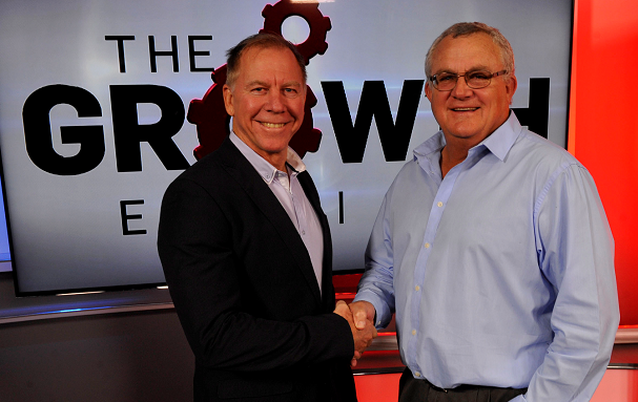WE AIM to make the greatest possible global impact addressing the environmental issues associated with energy use … by using the biggest energy users in the world to fundamentally change the way they use energy more profitably."
This is a lofty ideal and, some would say, a far-fetched goal, but it is Ensight Energy Solutions’ vision.
Founded in 2003 in Australia, Ensight’s two directors are well equipped to follow through on their promises: Francis Barram has a background in the electricity industry and a degree in economics; Rod Welford is a commercial lawyer with a Master’s degree in environmental management who set up a State Environmental Protection Agency in Australia when he was state environment minister from 1998 to 2001. Both have a deep commitment to the environment and a belief that business will be a global driver in addressing — or failing to address — the challenge of climate change.
"In particular," says Mr Welford, "we believe that, far from the conventional view that addressing climate change is costly, climate change can be addressed at a profit by using energy and other resources more efficiently."
...
IN 2012 Ensight reviewed its direction, goals and business models and came up with a three-pronged approach: they need to work closely with businesses that "were among the biggest energy users on the planet"; they need to ensure change occurred in them; and they need to engage with them and provide a compelling business case for change.
"Simply telling businesses how much energy they could save does not drive change or provide meaningful information for managers," says Mr Welford.
"We work with the company’s engineers, but our real customers are the CEOs, CFOs (chief financial officers) and boards of our client companies.
"We provide them with the compelling financial benefits of the energy transformation programme we run in their business. This goes way beyond conventional energy engineering which provides reports with lists of recommendations that often end up never being implemented."
The leap from the page to practical implementation isn’t always easy. "Most companies in the resources sector traditionally focus on maximising production. When commodity prices are high, this makes sense," Mr Welford says. "But when prices (and margins) are depressed, finding ways to address costs is critical.
"In-house resources are not available to divert attention from production and often the skills do not exist to manage the implementation of ‘expert opinions’ other than the most basic kind.
"In these complex industrial operations, this is not easy. If it was, everyone would already be doing it. Companies need a trusted partner to guide them through the change process, otherwise it is unlikely ever to be achieved. The risks of failure are perceived to be too high."
In 2012, Ensight was approached by Palabora Mining Company, incorporated in SA in 1956. Its mine in Limpopo is the country’s only producer of refined copper and provides the local market with 85% of its copper requirements.
"Rising energy prices and, more specifically, electricity prices forced us to reduce our energy costs," says Palabora’s GM for asset management, safety, health, environmental and quality Kobie Naude. "Electricity is our second-largest cost element to the business after employee-related costs."
Mr Naude says the company tried other companies to implement the Eskom demand-management programme, with little success.
"The Ensight concept of using a dedicated, professional team of people — permanently on site — to analyse all the opportunities in co-operation with the local workforce, and justify each project on financial terms, fascinated me as a workable approach," he says.
"It proved to be just what was needed. I know of no other company that uses this partnership model, where they share in the actual measured and verified savings; it’s a real win-win approach."
...
LIKE many companies, when Palabora Mining came under financial stress from its old operation and falling copper prices, the need to focus on costs became critical.
"Our work with Palabora, to help them find a solution to the challenges that threatened their business, became the prototype for our Energy Leadership Programme," says Mr Welford.
"We work with the client’s operational staff to identify, evaluate and implement major change that is transformational rather than incremental to individual silos or plant items. Also, it does not just work to ‘reduce the negatives’ of fossil fuel use, it demonstrably reduces ongoing operational costs and boosts company profits."
Mr Naude puts Palabora’s total savings so far at R108m with net savings of "R60m this year alone" in energy costs. Palabora has also received more than R21m from Eskom for savings performance; saved enough energy to power more than 77,000 households for a year; saved enough coal to drive a steam train for 268,000km — the distance from Cape Town to Cairo and back 17 times; saved 148-million litres of water; and saved carbon commensurate with removing 463 cars from the road for a year.
Naude puts the amount of CO² not released into the atmosphere due to Ensight’s programme at 120,000 tonnes.
"Our primary business is reducing carbon emissions and energy costs," says Welford. "We focus on energy, water and materials efficiency in complex, energy-intensive industrial operations. We focus on companies that have an annual energy bill above about R500m a year.
"We have done renewables, such as solar systems in the past, installing solar systems in several hundred schools in Australia. However, our experience proves that saving energy is safer, quicker and costs less than producing energy, whether by conventional fossil-fuelled power stations or solar/renewable energy systems. The economics of energy efficiency outperform all other renewable energy options for reducing fossil fuel dependency."
Ensight’s work with Rio Tinto’s Richards Bay Minerals saved that company R84m in the first year of its Energy Leadership Programme. Their success is first and most obviously felt on a client’s bottom line: addressing energy usage without supporting profit is unlikely to spark much interest. But these impressive savings must "go" somewhere.
"The indirect effects also help Eskom address the wider social impacts of electricity shortages by reducing the load our clients place on the electricity grid, thus freeing up supply for consumers," says Mr Welford. "The more energy our clients can save, the more remains available for families and households across SA. And, of course, every tonne of carbon emission avoided helps head off the threat of devastating impacts of climate change."
...
MR NAUDE says SA lags far behind other countries in energy savings and alternatives. "Especially compared to First World countries such as Germany — it’s power consumption has decreased over the past five years and their economy actually grew during this period."
Ensight’s programme ensures that personnel feel they are part of the solution, not part of the problem. "They learn the principles of energy saving, which they cannot only apply in their employer’s company, but in their own homes to save energy and reduce the impacts of rising electricity prices on their family’s cost of living," says Mr Welford.

Rod Welford, executive chairman of Ensight Energy Solutions company, left, and Kobie Naude, general manager of asset management at Palabora Mining Company, at the BDTV Studio in Rosebank. Picture: FREDDY MAVUNDA
WE AIM to make the greatest possible global impact addressing the environmental issues associated with energy use … by using the biggest energy users in the world to fundamentally change the way they use energy more profitably."
This is a lofty ideal and, some would say, a far-fetched goal, but it is Ensight Energy Solutions’ vision.
Founded in 2003 in Australia, Ensight’s two directors are well equipped to follow through on their promises: Francis Barram has a background in the electricity industry and a degree in economics; Rod Welford is a commercial lawyer with a Master’s degree in environmental management who set up a State Environmental Protection Agency in Australia when he was state environment minister from 1998 to 2001. Both have a deep commitment to the environment and a belief that business will be a global driver in addressing — or failing to address — the challenge of climate change.
"In particular," says Mr Welford, "we believe that, far from the conventional view that addressing climate change is costly, climate change can be addressed at a profit by using energy and other resources more efficiently."
...
IN 2012 Ensight reviewed its direction, goals and business models and came up with a three-pronged approach: they need to work closely with businesses that "were among the biggest energy users on the planet"; they need to ensure change occurred in them; and they need to engage with them and provide a compelling business case for change.
"Simply telling businesses how much energy they could save does not drive change or provide meaningful information for managers," says Mr Welford.
"We work with the company’s engineers, but our real customers are the CEOs, CFOs (chief financial officers) and boards of our client companies.
"We provide them with the compelling financial benefits of the energy transformation programme we run in their business. This goes way beyond conventional energy engineering which provides reports with lists of recommendations that often end up never being implemented."
The leap from the page to practical implementation isn’t always easy. "Most companies in the resources sector traditionally focus on maximising production. When commodity prices are high, this makes sense," Mr Welford says. "But when prices (and margins) are depressed, finding ways to address costs is critical.
"In-house resources are not available to divert attention from production and often the skills do not exist to manage the implementation of ‘expert opinions’ other than the most basic kind.
"In these complex industrial operations, this is not easy. If it was, everyone would already be doing it. Companies need a trusted partner to guide them through the change process, otherwise it is unlikely ever to be achieved. The risks of failure are perceived to be too high."
In 2012, Ensight was approached by Palabora Mining Company, incorporated in SA in 1956. Its mine in Limpopo is the country’s only producer of refined copper and provides the local market with 85% of its copper requirements.
"Rising energy prices and, more specifically, electricity prices forced us to reduce our energy costs," says Palabora’s GM for asset management, safety, health, environmental and quality Kobie Naude. "Electricity is our second-largest cost element to the business after employee-related costs."
Mr Naude says the company tried other companies to implement the Eskom demand-management programme, with little success.
"The Ensight concept of using a dedicated, professional team of people — permanently on site — to analyse all the opportunities in co-operation with the local workforce, and justify each project on financial terms, fascinated me as a workable approach," he says.
"It proved to be just what was needed. I know of no other company that uses this partnership model, where they share in the actual measured and verified savings; it’s a real win-win approach."
...
LIKE many companies, when Palabora Mining came under financial stress from its old operation and falling copper prices, the need to focus on costs became critical.
"Our work with Palabora, to help them find a solution to the challenges that threatened their business, became the prototype for our Energy Leadership Programme," says Mr Welford.
"We work with the client’s operational staff to identify, evaluate and implement major change that is transformational rather than incremental to individual silos or plant items. Also, it does not just work to ‘reduce the negatives’ of fossil fuel use, it demonstrably reduces ongoing operational costs and boosts company profits."
Mr Naude puts Palabora’s total savings so far at R108m with net savings of "R60m this year alone" in energy costs. Palabora has also received more than R21m from Eskom for savings performance; saved enough energy to power more than 77,000 households for a year; saved enough coal to drive a steam train for 268,000km — the distance from Cape Town to Cairo and back 17 times; saved 148-million litres of water; and saved carbon commensurate with removing 463 cars from the road for a year.
Naude puts the amount of CO² not released into the atmosphere due to Ensight’s programme at 120,000 tonnes.
"Our primary business is reducing carbon emissions and energy costs," says Welford. "We focus on energy, water and materials efficiency in complex, energy-intensive industrial operations. We focus on companies that have an annual energy bill above about R500m a year.
"We have done renewables, such as solar systems in the past, installing solar systems in several hundred schools in Australia. However, our experience proves that saving energy is safer, quicker and costs less than producing energy, whether by conventional fossil-fuelled power stations or solar/renewable energy systems. The economics of energy efficiency outperform all other renewable energy options for reducing fossil fuel dependency."
Ensight’s work with Rio Tinto’s Richards Bay Minerals saved that company R84m in the first year of its Energy Leadership Programme. Their success is first and most obviously felt on a client’s bottom line: addressing energy usage without supporting profit is unlikely to spark much interest. But these impressive savings must "go" somewhere.
"The indirect effects also help Eskom address the wider social impacts of electricity shortages by reducing the load our clients place on the electricity grid, thus freeing up supply for consumers," says Mr Welford. "The more energy our clients can save, the more remains available for families and households across SA. And, of course, every tonne of carbon emission avoided helps head off the threat of devastating impacts of climate change."
...
MR NAUDE says SA lags far behind other countries in energy savings and alternatives. "Especially compared to First World countries such as Germany — it’s power consumption has decreased over the past five years and their economy actually grew during this period."
Ensight’s programme ensures that personnel feel they are part of the solution, not part of the problem. "They learn the principles of energy saving, which they cannot only apply in their employer’s company, but in their own homes to save energy and reduce the impacts of rising electricity prices on their family’s cost of living," says Mr Welford.






















Change: -0.80%
Change: -1.03%
Change: -0.24%
Change: -1.13%
Change: -1.10%
Data supplied by Profile Data
Change: 0.13%
Change: 0.12%
Change: -0.80%
Change: 0.00%
Change: 0.17%
Data supplied by Profile Data
Change: 0.08%
Change: -1.00%
Change: -0.07%
Change: -0.15%
Change: 0.70%
Data supplied by Profile Data
Change: 0.30%
Change: 1.22%
Change: 0.00%
Change: 0.50%
Change: 1.11%
Data supplied by Profile Data